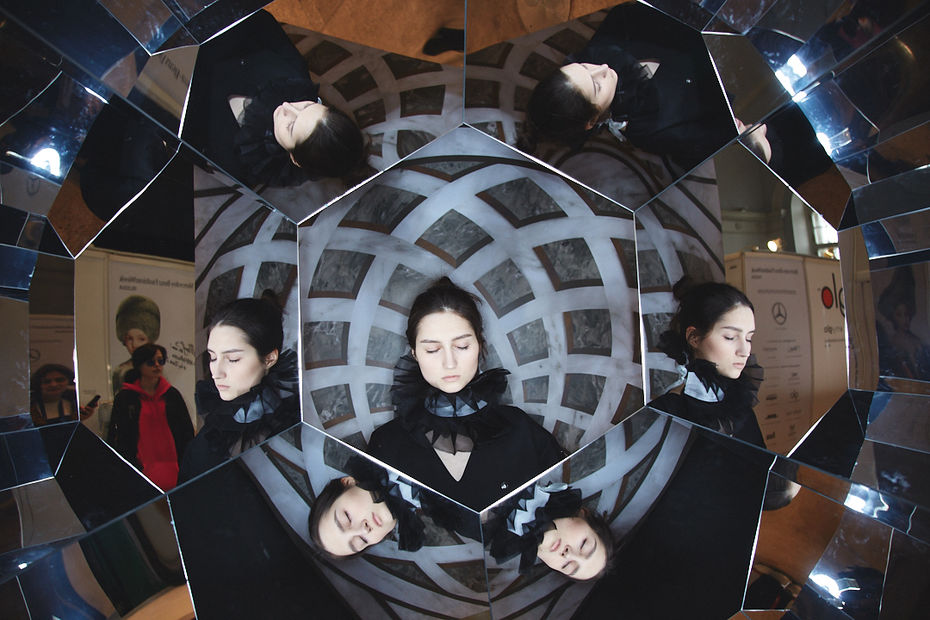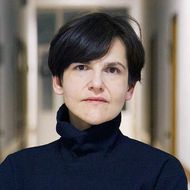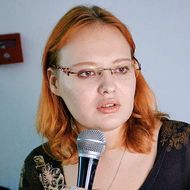Cyber Performance, PROK Cinema, and Digital Art: The Development of Art and Art Research in the 21st Century

From April 21 to 23, 2021, a major online conference of the HSE Art and Design School and the Doctoral School of Art and Design was held on ‘Theories and Practices of Art and Design: Sociocultural, Economic and Political Contexts.’ Experts discussed educational practices in art, its contemporary state, the impact of technology, and prospects for the art industry’s future development.
The conference programme included more than ten sessions in different formats — roundtable discussions, workshops, discussions and reports. The experts were teachers of art, staff members of cultural institutions and researchers from Russia, the USA, Canada, Great Britain, Norway and other countries. They spent three days discussing how art changed in the 20th century, what it looks like today, and what the future holds, including the impact of technology development.
The conference on ‘Theories and Practices of Art and Design: Sociocultural, Economic and Political Contexts’ was an associated event as part of the XXII April International Academic Conference, which was organized by HSE University and SBER.
Education in Art
An important part of the conference was a discussion of education practices in Russia and abroad that took place at the roundtable on ‘Education in the Field of Art and Design: Formats and Perspectives’. Most of the discussion was dedicated to PhD by Practice.
‘On the one hand, we are considering the opportunity to develop PhD by Practice today in Russia,’ said Tatiana Rivchun, Deputy Dean of the HSE Faculty of Communications, Media, and Design. ‘On the other hand, we are discussing so-called “professional degrees”. For example, many international universities offer doctoral programmes in design, and in Russia, there are MBA and DBA programmes, which are not academic, but professional degrees. PhD by Practice is a different thing: it is a real academic degree that combines a theoretical part (the thesis text) and a project (exhibition, collection, etc). This is particularly relevant for the art and design industry.’
Jenna Rossi-Camus, a researcher and teacher from Great Britain, spoke about her experience of getting a PhD by Practice at the London College of Fashion of the University of the Arts.
‘Great Britain has a long tradition of PhD by Practice,’ shared Jenna. ‘I talked to students from various colleges, and I remember them talking a lot about the methods to evaluate the practical part. Supervision teams in PhD by Practice must have a certain structure: two supervisors, one of whom works more with theory and the other with practice.’
Jenna said that her team was balanced in these terms: on the one hand, there was someone who was able to evaluate the theoretical part of the work, while on the other there was a practice-oriented supervisor. She also emphasized that this format requires particular flexibility since the committee not only has to assess the textual part, but also a project, which can be a series of paintings, a film, or a performance.
Irina Sakhno, Professor at the HSE Art and Design School, shared her thoughts on the complicated structure of the PhD by Practice educational track.
What the HSE Art and Design School is doing is completely innovative. We are probably the first to promote the positioning of practical research
Irina admitted that it’s hard to be the pioneers since there are more questions than answers. ‘There are very many definitions that are difficult to sort out; we have studied a lot of publications and international university experiences,’ she said. ‘Furthermore, I worry about the methods to assess such research [as a practical project]. There is a kind of research matrix that should be based on creative competencies. I believe this is the cornerstone idea. The second issue that interests me as a researcher is the format in which the theoretical and methodological focus should be presented and how the research object should be documented. Is there a repository or an archive, such as images, video formats, inter- or trans-disciplinary representations? This remains an open question for us.’
Liudmila Alyabieva, Academic Director of the Doctoral School of Arts and Design, said that they are looking for new conventions and are in fact elaborating new rules for the game, which is impossible without an active discussion within the academic community.
Arts and Technology
During the Media Art session, conference participants gave presentations on unconventional forms of art, including cyber performance, PROK cinema, digital art and others. Stanislav Milovidov, a doctoral student of the Art and Design School, spoke about the new visual images in generative computer art of the late 2010s.
‘Machine learning is used in generative computer art and one such area that evolved in late 2010s is the so-called “Artificial Art”,’ Stanislav explained, noting that this field is based on studying the systems of automatic design and using it to create works of art, which may be supplemented by user algorithms. The speaker said that generative art appeared in the 20th century, but the new field has a considerable difference: ‘Neural networks are not only able to reproduce processes according to pre-set algorithms, but they can also create an unlimited number of various results. Artists believe that these practices are more like growing a certain organic structure rather than building an object from separate parts according to a plan.’
For artists, the idea of machine learning as an artistic method is not in the result that it creates but rather in the process of learning itself
Roman Khmelev of the Saint Petersburg Stieglitz State Academy of Art and Design spoke about NFT technologies in arts. He explained that initially, the technology served as a kind of digital currency, but today, it can perform different functions. NFT has always had one specific feature: it is built on the concept of deficit; the ‘object’ is worth something until there are people who ‘believe’ in it.
‘This is very important, since it’s the basis of NFT. A picture with a unique code that we buy is no different from a picture that we simply send, which means that we are basically staring at the price tag, superficially speaking,’ Roman admitted. ‘But NFT is a kind of reaction to ways of consuming the streaming services, to the model that provides us temporary access to something. This feature is very important, since people want to possess things, to appropriate them.’
Roman also explained that NFT is a kind of electronic identifier, which confirms ownership rights for a digital collectible object. Today, he says, this technology is actively used not only as a selling object for a work of art: ‘Many celebrities are entering this field by selling various digital goods from tweets to pictures, to memes, etc’. Sellers use marketplace-like platforms for this, he said.

Liudmila Alyabieva, Academic Director of the Doctoral School of Arts and Design
This year’s conference featured a few ‘premieres’. For the first time, it included a session on ceramics, textiles and glasswork, which attracted a list of renowned speakers from around the world, including the globally recognized ceramics artist Kate Malone and researcher and activist Wendy Gers, as well as a session on sound research.
The conference that has traditionally brought together art and design theoreticians and professionals forms a unique inclusive space for a dialogue, which is a prerequisite for development of art and design practices, as well as art and design studies.

Tatiana Fadeeva, Associate Professor at the HSE Art and Design School
One of this year’s important innovations is ‘The Students’ Cases Festival’, which gives students of different Art and Design School profiles (Comic Strips, Environmental Design, Design and Contemporary Art, Theatre and Cinema Art etc) and other universities the opportunity to present their visual studies. The competitive process chose studies that have conceptual significance and address the relevant cultural problems of today. These works are based on systematic analysis, where the visual part is primary.
The XXII April International Academic Conference on Economics and Social Development was held from April 13 to 30, 2021. For the first time, the conference was co-organized by HSE University and Sberbank. The programme included a series of academic and expert discussions as part of the HSE-Sberbank Discussion Club – an expert platform that brings together academics, business representatives, and public officials to discuss critical economic and social challenges and share best practices in the sphere of business and institutional development, thereby laying out a path to the future.
See also:
24 Countries Represented at 25th Yasin International Academic Conference Held by HSE University
The Programme Committee of the 25th Yasin (April) International Academic Conference on Economic and Social Development has summed up the initial results. In 2025, 1,384 people from 24 countries and 29 Russian regions participated in the conference, with 335 of them delivering presentations.
Stuck in the Net: How Much Time Children Spend Online
On average, a schoolchild spends 48 hours a week on studies—equivalent to a six-day working week for an adult. This was highlighted by experts at the round table ‘Domains of Children’s Well-Being Evaluation for Human Potential and Evidence-Based Social Policy Development,’ held as part of the 25th Yasin (April) International Academic Conference.
Russian and Chinese Scholars Share Experience of Transformation of Doctoral Education
The Russian and Chinese postgraduate education systems originally borrowed their institutional frameworks from the Soviet Union. However, in the 21st century, they have evolved along different paths. While key performance indicators for postgraduate programmes in Russia are declining, China is seeing a rapid increase in the number of postgraduate students. These contrasting trajectories and the reforms undertaken in each country in recent decades were the focus of a roundtable discussion held as part of the 25th Yasin (April) International Academic Conference.
Nobel Laureate Proposes Solution to Markov Equilibrium Problem
In dynamic games, a Markov equilibrium involves strategies that guide players' behaviour based on the current state of the game, rather than its entire history. This approach is effective when players have access to complete information. But when uncertainty arises in the game—for instance, when players are unsure of who they are dealing with—this approach can become problematic. Eric Maskin, Nobel Laureate in Economics and Professor at Harvard University, addressed this issue in a paper presented at the XXV Yasin (April) International Academic Conference on Economic and Social Development held at HSE University from April 15 to 18, 2025.
‘The World Is Becoming More Complex and Less Predictable’: What Scientists Say about the Future
The future is now more difficult for researchers to forecast, and events that are hard to predict are playing an increasingly significant role. But there is good news too: scientists are confident that humanity will adapt to any changes. This was the focus of discussion at the International Symposium ‘Foresight in a Rapidly Changing World,’ which took place as part of the 25th Yasin (April) International Academic Conference.
Fragmentation and Bloc Formation: How the Global Economy is Changing
Sergey Dubinin, former head of the Bank of Russia and Professor of Finance and Credit at the Faculty of Economics at Moscow State University, has delivered an honorary address at the XXV Yasin (April) International Academic Conference. He spoke about the transformation of the global monetary and financial system, as well as the Russian economy.
More Children, More Happiness: HSE Experts Study Impact of Number of Children on Russians' Assessment of Happiness
Russians with children feel happier than those without children. At the same time, the number of children influences the assessment of happiness: the more children Russians have, the happier they feel. These conclusions were outlined inthe report ‘More Children, More Happiness: The Impact of the Number of Children on Russians’ Assessment of Happiness,’ presented at the XXV Yasin (April) International Academic Conference on Economic and Social Development, held on April 15–18 at HSE University. The study was conducted by Elena Churilova, Senior Research Fellow, and Dmitry Jdanov, Chief Research Fellowat HSE International Laboratory for Population and Health.
HSE Expands Cooperation with Gulf Countries
HSE University and the Centre for International Policy Research (Qatar) have agreed to collaborate in the field of social sciences, with plans for joint research, academic exchanges, and regular expert engagement. The agreement was signed during the roundtable ‘State Capacity and State Resilience in the Global South,’ held as part of the 25th Yasin (April) International Academic Conference at HSE University.
‘We Grow Old before We Become Rich’: How BRICS Countries Can Achieve Economic Growth
Due to population aging, many countries aiming for economic prosperity have limited time left to undergo economic transformation, according to the honorary report Narratives Versus Reality on Employment and Demography: How Undermining Institutions Can Push Countries Out of the ‘Narrow Corridor’ by Santosh Mehrotra of the University of Bath. The report was presented at the XXV Yasin (April) International Academic Conference.
XXV Yasin (April) Academic Conference Kicks Off at HSE University
The anniversary 25th Yasin (April) International Academic Conference on Economic and Social Development will take place from April 15 to 18. This year, over a thousand applications were submitted to present at the conference, of which the Programme Committee selected 381 of the best research papers in their respective fields.


